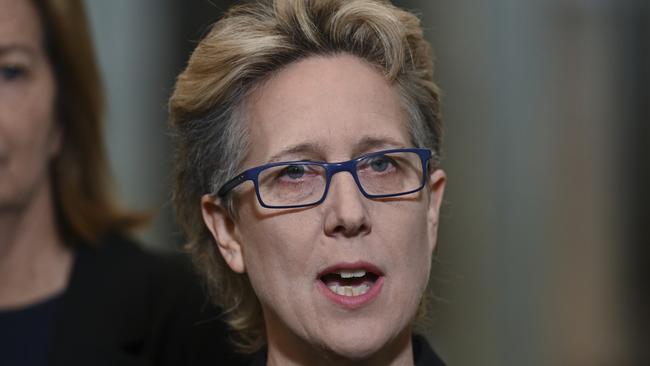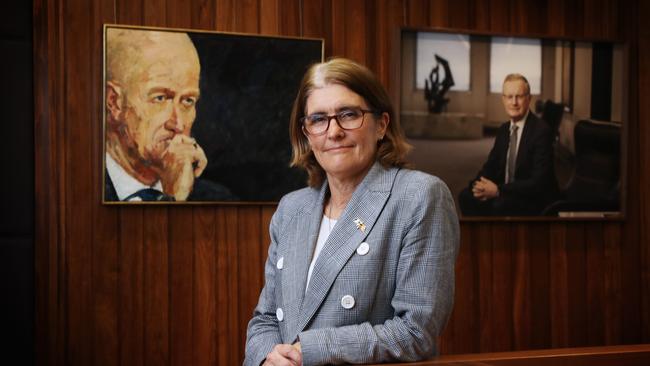Unions demand an RBA revolution under new governor Michele Bullock
Unions are demanding a radically different approach from the Reserve Bank of Australia under the leadership of Michele Bullock.

Unions are demanding a radically different approach from the Reserve Bank of Australia under the leadership of Michele Bullock, warning against relying on the “blunt tool” of interest rate rises to lower the living standards of working Australians.
With Ms Bullock’s tenure at the RBA beginning on Monday, the heads of the ACTU, the Australian Workers Union and the CFMEU have launched a pre-emptive plea against maintaining the strategy of Philip Lowe and using interest rate rises to push up unemployment to the central bank’s target of 4.5 per cent.
The union leaders say the RBA needs to be more focused on full employment and tackling inflation through curtailing corporate profits, despite a Productivity Commission report released last week rejecting claims that the profit share of workers had plunged over recent years.
ACTU national secretary Sally McManus said there had for too long been a “real divide between the decision-making process of the RBA and the lived experiences of working people”.
“Change in the RBA leadership and board is an opportunity to bridge that disconnect,” Ms McManus told The Australian.
“Working families across our suburbs and regions have felt the pain of the RBA’s decisions.”
Ms McManus said the central bank needed to change direction and focus on full employment and the impact of “excessive corporate profits” on inflation.
She said the RBA should reject the “1970s” paradigm that wage rises caused inflation.
“The new leadership needs to consider the realities of the Australian economy with fresh eyes. We have a very different wages system to the 1970s and Michele Bullock’s approach should respect that,” she said. “Working people have been punished for an inflation problem they did not cause, and this has put severe pressure on working families.
“We hope the new governor will consult directly with people who understand these issues.”

In her previous role as deputy governor of the RBA, Ms Bullock infuriated the unions by declaring that unemployment needed to increase to 4.5 per cent to bring inflation to the bank’s target range of 2-3 per cent.
Unions are instead pushing the RBA to consider full employment as “zero involuntary unemployment”, with the upcoming employment white paper to advise on what policymakers should consider as the optimal level of unemployment.
Jim Chalmers is planning to legislate reforms to the RBA this year to implement the 51 recommendations from the review into the central bank, including changing its mandate to place a greater emphasis on the full employment goal and creating a separate monetary policy-setting board.
In a sign unions could have a greater influence over the RBA, Labor’s national conference in August backed the government considering the appointment of worker representatives to the board of the central bank.
The Treasurer, a member of the AWU, in April installed two former ACTU representatives on the bank’s board.
AWU national secretary Paul Farrow said the “RBA is overdue for a shake-up and I hope that happens early during Michele Bullock’s term”.
“We can’t keep inflicting crushing pain on regular Australians while allowing corporations to jack up prices and pocket massive profits,” Mr Farrow told The Australian.
“The RBA should refocus on what matters: real wage growth, creating jobs, and having a board with the skills and experience to support workers in the labour market.
“The RBA should be working more closely with the government so it isn’t just relying on the blunt tool of interest rates.” Construction Forestry Maritime Mining and Energy Union national secretary Zach Smith said Australia needed a central bank that “works for society, not the other way around”.
He accused the RBA of being an institution that “suffers from neo-liberal tunnel vision that makes it impossible to put people first”.
“We must end the fetishisation of corporate profits while working people are punched in the guts with one-two body blows of inflation and rate rises,” he said.
“Australian workers are bloody sick of being the ones who have to cop it every single time there’s an economic headwind.”
Mr Smith said the union would continue to lobby Anthony Albanese to adopt a super profits tax to put downward pressure on inflation and provide more investment for housing.
Australian Chamber of Commerce and Industry chief executive Andrew McKellar said the unemployment target could be lowered if the government embarked on a new round of economic reform that would enhance productivity but there was “nothing in the union movement’s agenda which in any way relates to that”.
“The narrative some in the union movement are trying to develop is misguided,” he said.
“The measure of full employment that the Reserve Bank interprets is an empirical one. It is clearly not zero.
“To try and drive the point where there was absolutely no transitional unemployment or underemployment … would be extremely difficult.
“There is nothing to say you can’t increase the speed limit in the economy and lower the level of unemployment at which we reach full employment, but to do that you have got to have a very significant program of economic reform.”







To join the conversation, please log in. Don't have an account? Register
Join the conversation, you are commenting as Logout